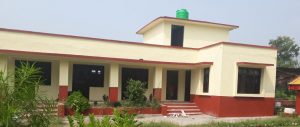A Boost for Machinery Testing and Training in Nepal

NALWAPUR, Nepal (CSISA) – A targeted investment by the U.S. Agency for International Development has boosted the government of Nepal’s capacity to test innovative, scale-appropriate agricultural machinery and conduct agricultural machinery training programs for local farmers, operators and mechanics.
In collaboration with the Cereal Systems Initiative for South Asia in Nepal (CSISA)’s Mechanization and Irrigation project, the government of Nepal is launching two new centers in the coming months: an Agricultural Machinery Testing and Research Center, established by the Nepal Agricultural Research Council (NARC), and the Central Agricultural Machinery Training Center, established by the Department of Agriculture’s Directorate of Agricultural Engineering.
The Agricultural Machinery Testing and Research Center will greatly improve NARC’s capacity to evaluate agricultural machinery as well as to suggest changes, and where appropriate, implement design improvements. The center will allow NARC to oversee the quality of manufactured agricultural machinery as a service to importers, local manufacturers and Nepal’s farmers.
The Central Agricultural Machinery Training Center aims to strengthen the Directorate of Agricultural Engineering’s capacity to conduct training programs on agricultural machinery operation and maintenance for farmers and service providers, and for agricultural machinery repair for mechanics. The establishment of these new centers fulfills part of Nepal’s Agriculture Mechanization Promotion Policy, as well as the larger Agricultural Development Strategy of Nepal.
Collaborative work between CSISA, NARC and the Engineering Directorate began in 2015 with the initial site selection process. Both NARC and the Engineering Directorate wanted the centers to be centrally located to facilitate collaboration, dialogue and knowledge sharing between the centers. The NARC center obtained a 10-hectare parcel of underutilized research farmland in Nawalpur, overseen by a separate NARC research program, which is undergoing renovations to create offices, storage and equipment space. The Directorate of Agricultural Engineering finalized selection of a nearby site, which is currently undergoing approval by the Ministry of Agriculture and Development.
CSISA, NARC and the Engineering Directorate have now started the procurement process of relevant machinery for the facilities. For NARC, one of the center’s most important testing machines is a dynamometer, which calculates exact power outputs of motors. This center also procured mechanical vibration testing equipment and various sensors for measuring torque, revolutions per minute, drawbar force and digital telemetry for data transfer from the machinery in testing. NARC has also started field-testing new two-wheel tractor seeders and planters.
For the Engineering Directorate’s Machinery Training Facility, a wide variety of tools and equipment have been procured to support upcoming agricultural trainings. The equipment includes diverse hand tools, power tools, field equipment, tractors, tractor attachments and specialized training devices such as small agricultural machinery cutaways. Such machinery will be used to train lead farmers in the use and maintenance of scale-appropriate machinery, as well as to train technicians, mechanics and blacksmiths in machinery manufacturing and repair.
The establishment of these new centers represents a deepening of support by USAID and CSISA to scale-appropriate mechanization research and development in Nepal and highlights their long-standing commitment to, and cooperation with, the Government of Nepal, NARC and the Department of Agriculture, in providing research and technologies needed by Nepal’s farmers. As evidence of the government of Nepal’s commitment to these centers and the growth of agricultural mechanization, NARC recently announced a US$ 100,000 co-investment in the Agricultural Machinery Testing and Research Center, complementing the nearly US$ 300,000 investment made across both centers by CSISA.
The Cereal Systems Initiative for South Asia is led by the International Maize and Wheat Improvement Center and implemented jointly with the International Food Policy Research Institute and the International Rice Research Institute.
This article was authored by Scott Justice.
Photo credit: K. Bhatta/CIMMYT